Input interpretation

methyl vinyl ether
Chemical names and formulas
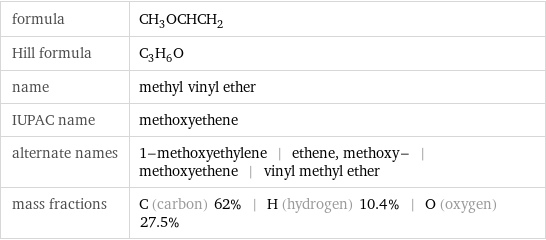
formula | CH_3OCHCH_2 Hill formula | C_3H_6O name | methyl vinyl ether IUPAC name | methoxyethene alternate names | 1-methoxyethylene | ethene, methoxy- | methoxyethene | vinyl methyl ether mass fractions | C (carbon) 62% | H (hydrogen) 10.4% | O (oxygen) 27.5%
Lewis structure
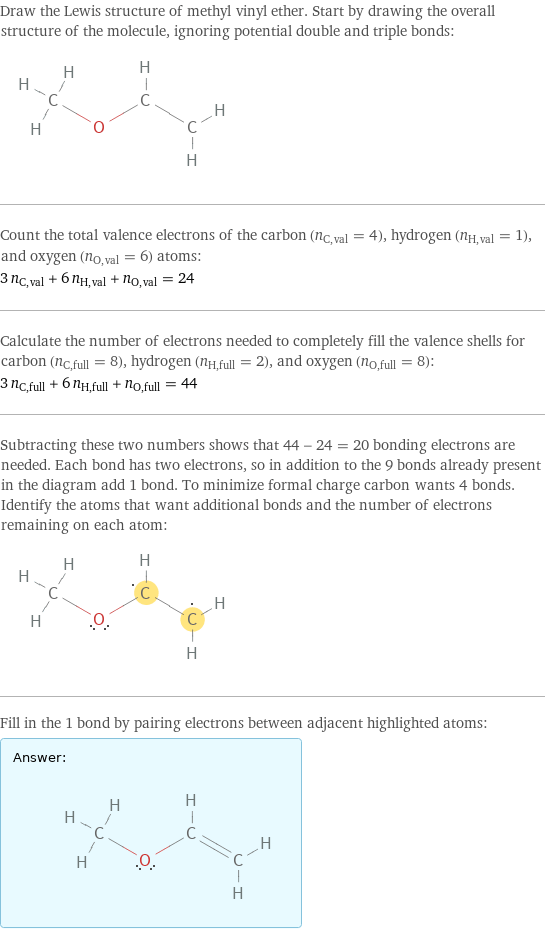
Draw the Lewis structure of methyl vinyl ether. Start by drawing the overall structure of the molecule, ignoring potential double and triple bonds: Count the total valence electrons of the carbon (n_C, val = 4), hydrogen (n_H, val = 1), and oxygen (n_O, val = 6) atoms: 3 n_C, val + 6 n_H, val + n_O, val = 24 Calculate the number of electrons needed to completely fill the valence shells for carbon (n_C, full = 8), hydrogen (n_H, full = 2), and oxygen (n_O, full = 8): 3 n_C, full + 6 n_H, full + n_O, full = 44 Subtracting these two numbers shows that 44 - 24 = 20 bonding electrons are needed. Each bond has two electrons, so in addition to the 9 bonds already present in the diagram add 1 bond. To minimize formal charge carbon wants 4 bonds. Identify the atoms that want additional bonds and the number of electrons remaining on each atom: Fill in the 1 bond by pairing electrons between adjacent highlighted atoms: Answer: | |
3D structure
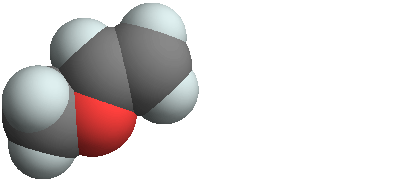
3D structure
Basic properties
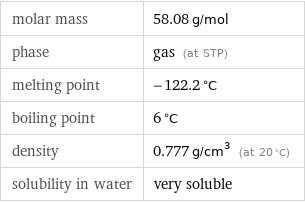
molar mass | 58.08 g/mol phase | gas (at STP) melting point | -122.2 °C boiling point | 6 °C density | 0.777 g/cm^3 (at 20 °C) solubility in water | very soluble
Units

Gas properties (at STP)
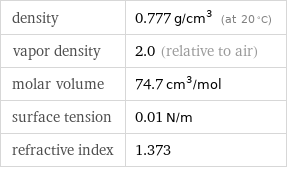
density | 0.777 g/cm^3 (at 20 °C) vapor density | 2.0 (relative to air) molar volume | 74.7 cm^3/mol surface tension | 0.01 N/m refractive index | 1.373
Units

Thermodynamic properties
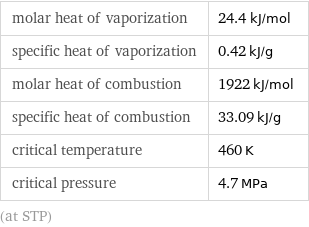
molar heat of vaporization | 24.4 kJ/mol specific heat of vaporization | 0.42 kJ/g molar heat of combustion | 1922 kJ/mol specific heat of combustion | 33.09 kJ/g critical temperature | 460 K critical pressure | 4.7 MPa (at STP)
Chemical identifiers
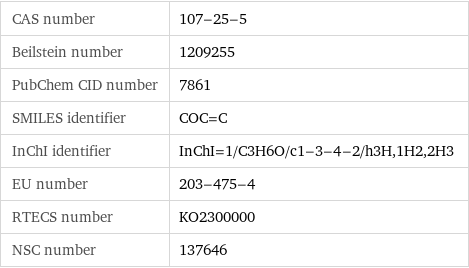
CAS number | 107-25-5 Beilstein number | 1209255 PubChem CID number | 7861 SMILES identifier | COC=C InChI identifier | InChI=1/C3H6O/c1-3-4-2/h3H, 1H2, 2H3 EU number | 203-475-4 RTECS number | KO2300000 NSC number | 137646
NFPA label

NFPA label
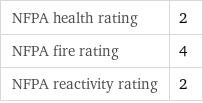
NFPA health rating | 2 NFPA fire rating | 4 NFPA reactivity rating | 2
Safety properties
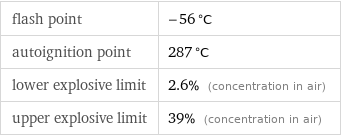
flash point | -56 °C autoignition point | 287 °C lower explosive limit | 2.6% (concentration in air) upper explosive limit | 39% (concentration in air)

DOT hazard class | 2.1 DOT numbers | 1087
Toxicity properties

RTECS classes | reproductive effector